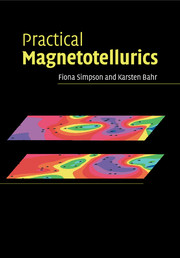Book contents
- Frontmatter
- Contents
- Preface
- Symbols
- 1 Introduction
- 2 Basic theoretical concepts
- 3 Planning a field campaign
- 4 From time series to transfer functions: data processing
- 5 Dimensionality and distortion
- 6 Numerical forward modelling
- 7 Inversion of MT data
- 8 The general link to other geosciences: conduction mechanisms
- 9 The special link to other geosciences
- 10 Other EM induction techniques
- Appendix 1 Theorems from vector calculus
- Appendix 2 The transfer function in the wavenumber-frequency domain and equivalence transfer functions
- Appendix 3 Probability distributions
- Appendix 4 Linear regression
- Appendix 5 Fourier analysis
- Appendix 6 Power and cross spectra
- Glossary
- References
- Index
7 - Inversion of MT data
Published online by Cambridge University Press: 03 December 2009
- Frontmatter
- Contents
- Preface
- Symbols
- 1 Introduction
- 2 Basic theoretical concepts
- 3 Planning a field campaign
- 4 From time series to transfer functions: data processing
- 5 Dimensionality and distortion
- 6 Numerical forward modelling
- 7 Inversion of MT data
- 8 The general link to other geosciences: conduction mechanisms
- 9 The special link to other geosciences
- 10 Other EM induction techniques
- Appendix 1 Theorems from vector calculus
- Appendix 2 The transfer function in the wavenumber-frequency domain and equivalence transfer functions
- Appendix 3 Probability distributions
- Appendix 4 Linear regression
- Appendix 5 Fourier analysis
- Appendix 6 Power and cross spectra
- Glossary
- References
- Index
Summary
Inversion schemes provide a ‘fast-track’ means for modelling data without the grind of forward modelling by allowing you to go from the data to the model, rather than the other way round. But beware – there are pitfalls, especially for the inexperienced!
In some inversion schemes the non-linear relationship between the model and the data is forced to be ‘quasi-linear’ by use of a transformation into a substitute model and data. In others, small model changes are assumed to have a linear relationship to small data changes. Once the required linear system of equations has been derived, the problem is reduced to one of inverting a matrix. The ‘Monte-Carlo inversions’ form another class of modelling algorithm. From a mathematical point of view, they are not strictly inversions at all, but rather long sequences of forward models in which conductivities are perturbed at random – as in a casino (à la Monte Carlo).
Because electromagnetic energy propagates diffusively, MT sounding resolves conductivity gradients, rather than sharp boundaries or thin layers. We should, therefore, think of MT as producing a blurred rather than a focussed image of the real Earth structure. Furthermore, because MT sounding is a volume sounding, the same features will be sampled by MT data at neighbouring sites when the inductive scale length is of the same order as or greater than the site spacing.
- Type
- Chapter
- Information
- Practical Magnetotellurics , pp. 130 - 145Publisher: Cambridge University PressPrint publication year: 2005



